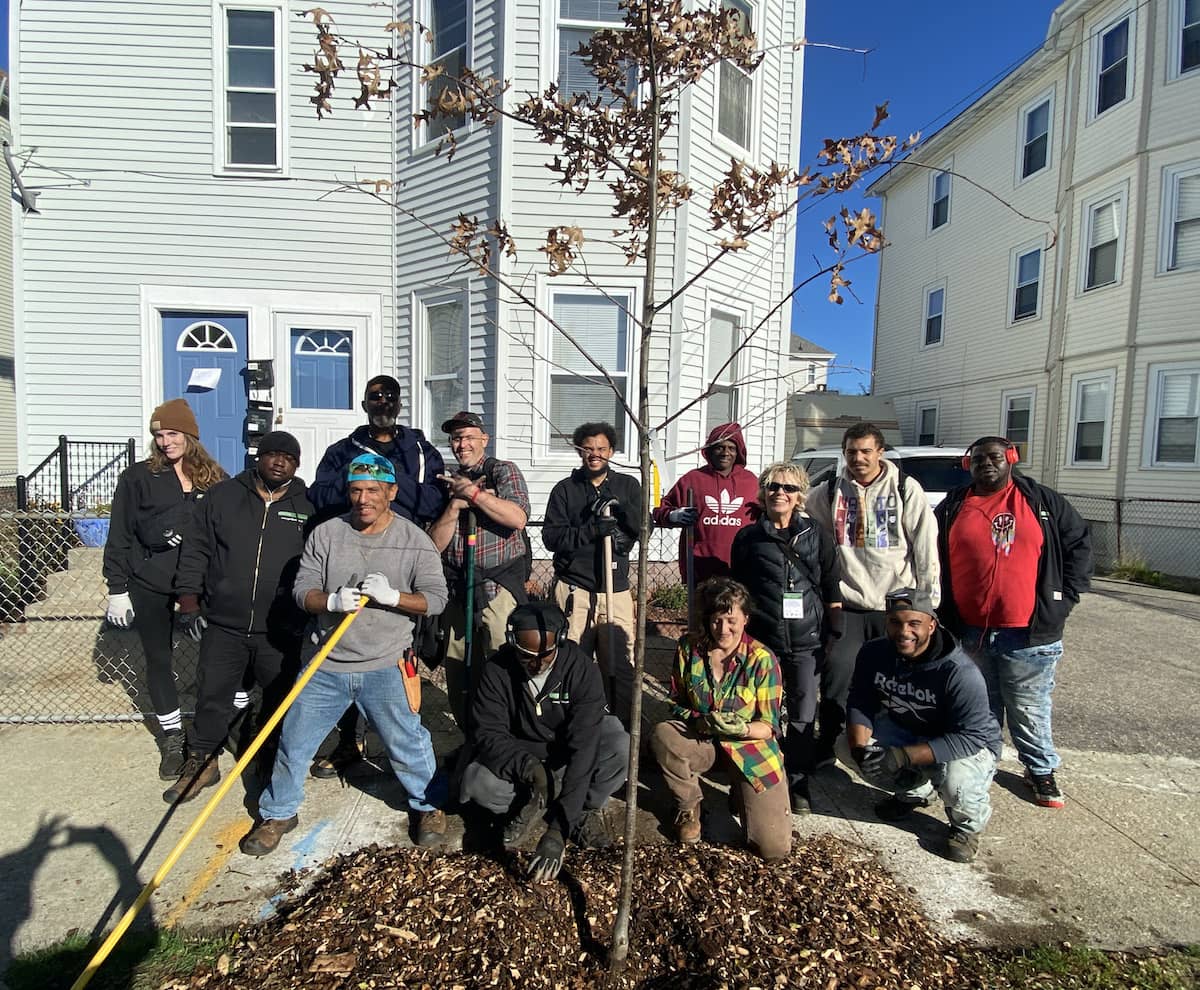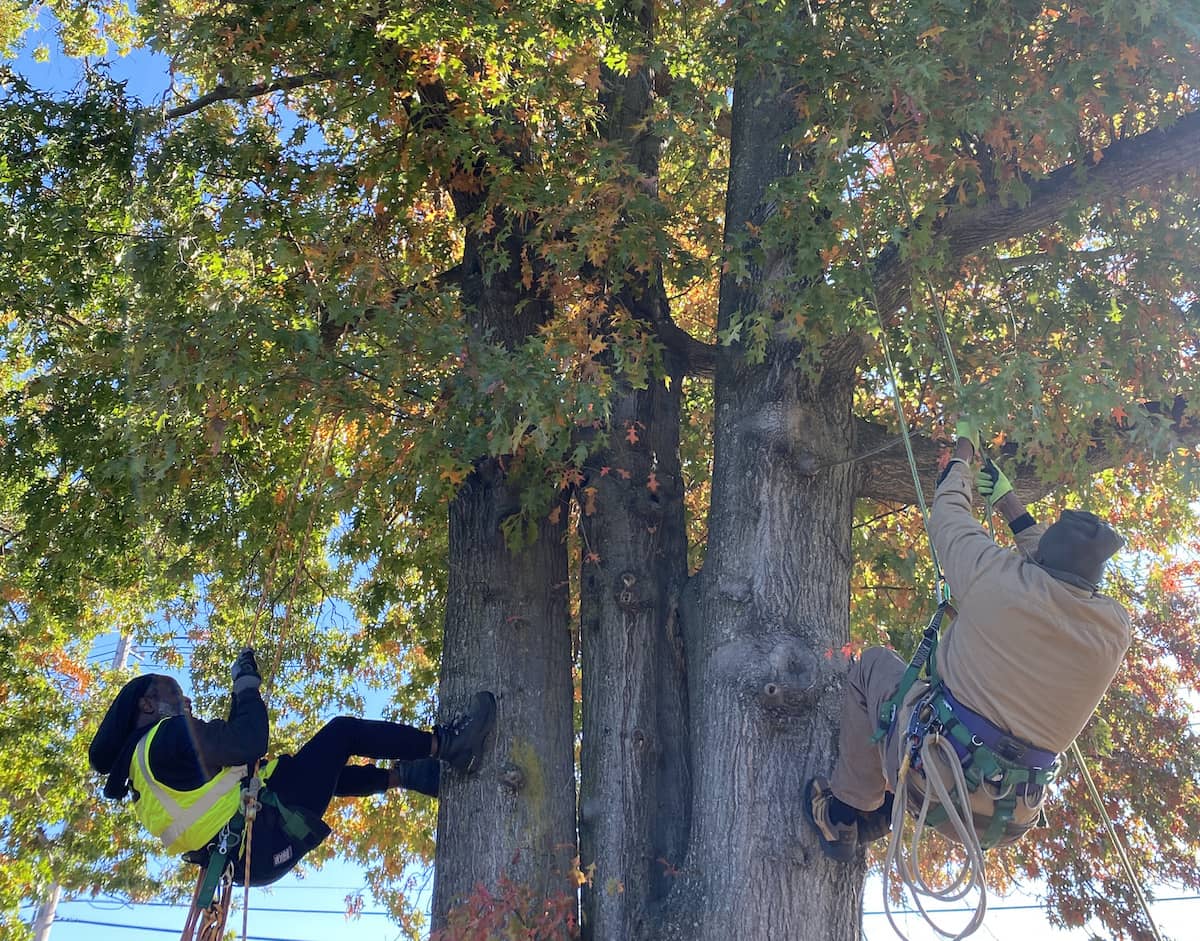Prior to joining American Forests, one of my greatest challenges running workforce development programs was finding the right funding. Often, grants were too restrictive, too cumbersome or contingent on complicated and difficult-to-measure metrics. Thanks to the Tree Equity Workforce Network (TEWN), a new peer group of pre-employment programs convened by American Forests, we’re working to address these challenges that programs face.
Workforce development is a critical component of American Forests’ equity mission, because, as CEO and President Jad Daley puts it, “Tree Equity is not about trees, it’s about people.”
Because of systemic injustices, neighborhoods that are underserved with trees are most often underserved economically. “We have intentionally integrated workforce into our approach because providing people with career opportunities emerging from urban forestry investment is a critical component to achieving the full potential uplift from Tree Equity,” Daley says. “We have a moral imperative to address the underlying economic inequity, not just tree inequity.”

Photo Credit: Garden Time
With this in mind, American Forests set out to develop a first round of funding through TEWN. These grants fit into the broader work of American Forests’ Career Pathways Initiative, which currently focuses in two workstreams: the WorkForest model, where we work with grassroots nonprofits to directly place individuals into entry-level tree care positions; and our newly-launched TEWN, which provides a space for peer learning and collaboration to expand capacity for pre-employment programs across the country.
American Forests launched TEWN in December 2022 as a result of feedback from a two-day Career Pathways Learning Lab that focused on implementation of the American Forests’ Arboriculture Pre-Employment Curriculum, a first-of-its-kind resource that integrates best practices from workforce development to build a more equitable and diverse tree care workforce. The Tree Equity Workforce Network aims to build capacity among organizations working to fill the tree care employment gap by sharing resources and best practices through a variety of activities, including webinars, one-on-one peer learning and facilitated networking opportunities.
Alongside Director of Career Pathways Tiffany Mrotek, we decided that we needed to approach the TEWN grant funding in ways that would have been most beneficial to us when we were running pre-employment programs. We agreed that the best funding relationships were collaborative in nature and didn’t require shifting the program to fit the grant. A few weeks ago, American Forests announced its first-ever TEWN awards, granting $100,000 to three organizations offering innovative approaches to pre-employment programs using the American Forests Arboriculture Pre-Employment Curriculum. The selection committee was astounded by the number and quality of submitted proposals through the inaugural competitive grant process, and ultimately, the three organizations that stood out and were awarded funding were Tucson Clean and Beautiful in Tucson, Ariz.; Garden Time in Providence, R.I.; and The Works, Inc. in Memphis, Tenn. The grantees represent different regions, climates and populations, and also offer diversity in how the projects incorporate the curriculum into their job training programs.
To adapt to the extreme heat of the southwest, Angelantonio Enriquez Breault, community restoration manager at Tucson Clean and Beautiful, says, “in order to plant the trees, you first must plant the water.” Their project will focus on opportunity youth and has made adjustments to American Forests’ curriculum to include green stormwater infrastructure to adapt to Arizona’s climate.
Garden Time in Providence, R.I., is a smaller organization that has deep and collaborative partnerships with the Providence Neighborhood Planting Program and Groundwork Rhode Island. Garden Time expands green jobs opportunities for reentry populations, and their project will build on the success of their Green Reentry Job Training program, an eight-week green industry job training focused on tree stewardship and environmental justice for returning citizens in Rhode Island.

Photo Credit: Garden Time
American Forests has been exploring urban wood reuse and the grant committee was excited to see a project that embraces this through The Works, Inc., in Memphis, Tenn. The Works, Inc. will use their grant to help grow and support their new initiative, which will prepare residents for careers at Memphis Urban Wood. There, they will reclaim and process urban wood into green lumber, biochar and compost for local and regional use.
The deliverables for each grant were co-created by each program and American Forests, and the year-long grant period will include cohort-style and individual technical assistance, as well as robust professional development through monthly webinars and Community Labs offered by TEWN.
“These grants will positively impact communities by pouring into programs that pave pathways to economic opportunity for people to make change in their own lives,” Daley says.
We are very excited about our grantees this year, and the only disappointing aspect of this process was that the number of high-quality proposals exceeded the funding spots we were able to offer. This clearly indicates a high need to continue to offer funding in this unique way. Our hope is that the success of these grants will spur interest from more funders to make this an annual opportunity for organizations and to potentially expand our cohort size and length, as well as the size of the awards. As a national leader at the intersection of urban forestry and workforce, we believe we are well-positioned to administer this funding and convene the network.
To learn more about the awards and TEWN, visit the Career Pathways webpage.